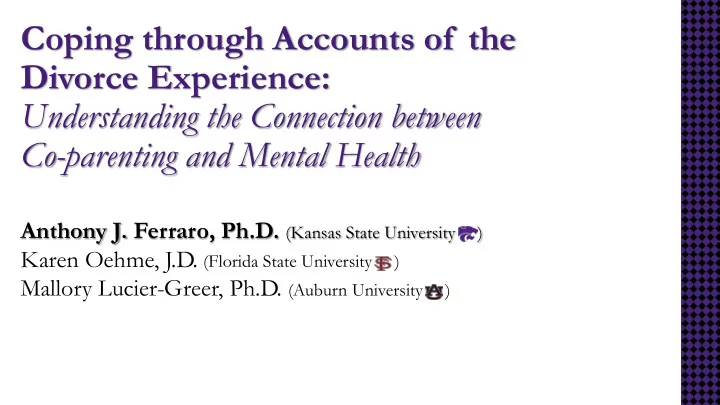

Coping through Accounts of the Divorce Experience: Understanding the Connection between Co-parenting and Mental Health Anthony J. Ferraro, Ph.D. (Kansas State University ) Karen Oehme, J.D. (Florida State University ) Mallory Lucier-Greer, Ph.D. (Auburn University )
Divorce & the Stress Process Framework • Why focus on divorce? • The number of children growing up with at least one nonresident parent is at its highest point in U.S. history (Vespa et al., 2013) • An estimated 1.2 million children experience a parental divorce yearly (estimate from SIPP data, 2009; see Kreider & Ellis, 2011)
Divorce & the Stress Process Framework • Why focus on divorce? • The divorce itself can be thought of as a discrete stressor, from which additional chronic stressors emerge or amplify (Pearlin, 1989) • The stress process framework (Pearlin et al., 1981) describes two forms of stressors: Discrete Stressors
Divorce & the Stress Process Framework • Why focus on divorce? • The divorce itself can be thought of as a discrete stressor, from which additional chronic stressors emerge or amplify (Pearlin, 1989) • The stress process framework (Pearlin et al., 1981) describes two forms of stressors: Discrete Stressors Chronic Stressors
Divorce & the Stress Process Framework • Why focus on divorce? • The stress process framework (Pearlin et al., 1981) : • The impact of stressors on the individual will often manifest in their mental health Discrete Mental Stressors Health Chronic Stressors
Divorce & the Stress Process Framework • Why focus on divorce? • The stress process framework (Pearlin et al., 1981) : • However, the resources available to an individual and their ability to cope with the stressors that present are anticipated to impact the relationship between stressors and mental health Discrete Mental Stressors Health Chronic • Personal Resources Stressors • Social Resources • Coping
Divorce & the Stress Process Framework • Why focus on divorce? • The stress process framework (Pearlin et al., 1981) : • However, when a divorce occurs… • Our social relationships may act as either a resource or a stressor depending upon their nature and quality (Pearlin, 1983) Discrete Mental Stressors Health Chronic ? • Personal Resources Stressors • Social Resources • Coping
Co-parenting • “The ways that parents work together in their roles as parents” (Feinberg, 2003, p. 1499) • Co-parenting relationships between former spouses are an important determinant of post-divorce adjustment, with various dimensions of co-parenting differentially tied to various indicators of individual well-being (e.g., Petren et al., 2017) ?
Personal Resources & Coping • Self-efficacy (Pearlin & Pioli, 2003) • Account-making (Harvey & Fine, 2006; Wallerstein & Blakeslee, 1989; Weiss, 1975) • Purpose of the current study Discrete Mental Stressors Health Chronic ? Stressors • Personal Resources • Coping
Method • Sample ( N = 609) • Inclusion criteria • Predominantly: • Female (82.1%) • White or Caucasian (80.6%) • Experiencing first divorce (79.7%) • Referenced a target child who was on average 7.40 years old ( SD = 4.64) • Measures • Four dimensions of co-parenting (Ferraro et al., 2016) • Self-efficacy (Sherer et al., 1982) • Perceived parental competence of the former partner (Feinberg et al., 2012) • Adverse mental health symptomology (Osman et al., 1997; Hewitt et al., 1992) • Analysis
Measurement Model
Mediation Model
Mediation Model
Mediation Model
Mediation Model (MCMM)
Mediation Model (MCMM)
Mediation Model
Mediation Model (MCMM)
Mediation Model (MCMM)
Mediation Model (MCMM)
Discussion • Continued support for self-efficacy as a predictor of mental health symptomology • Further utility in consideration of perceived competence as part of the account-making process • Theoretical separation of coping & personal resources • Connection between control and adverse mental health • Limitations • Future Directions
Thank You Any Questions?
Recommend
More recommend